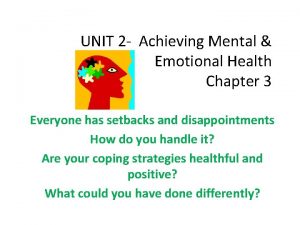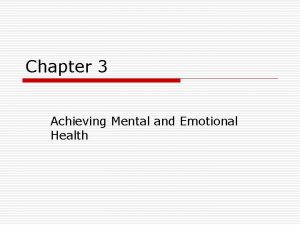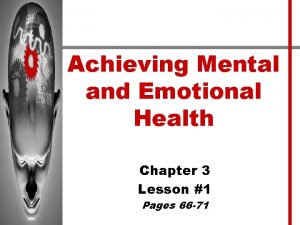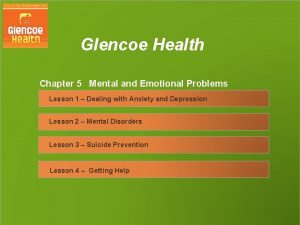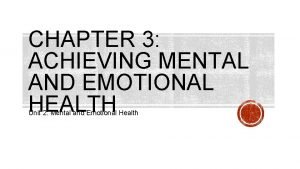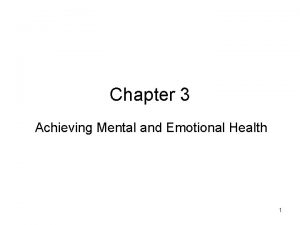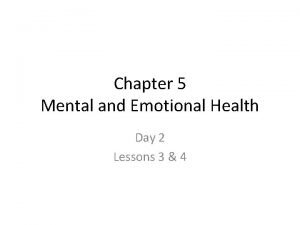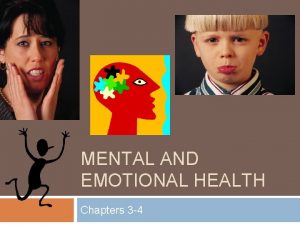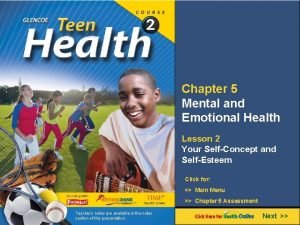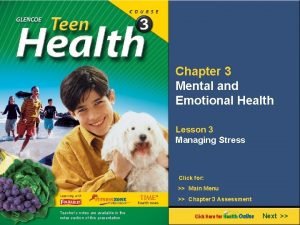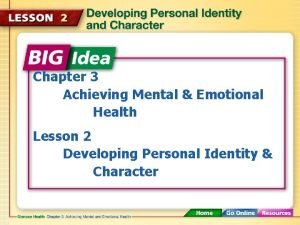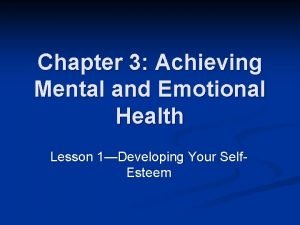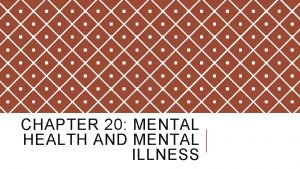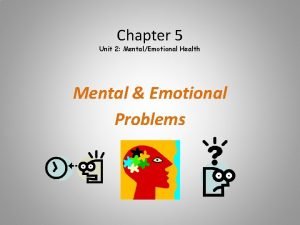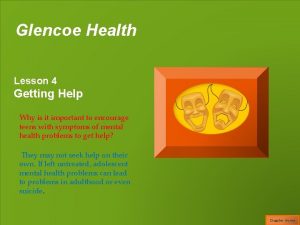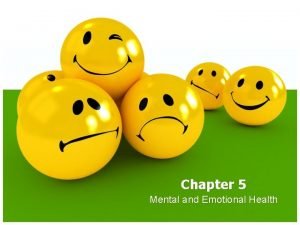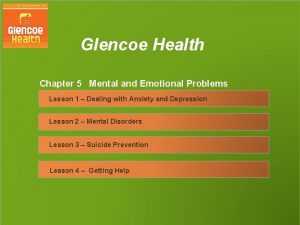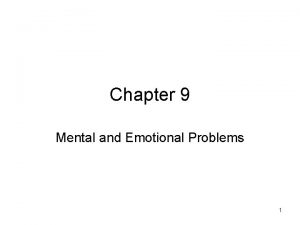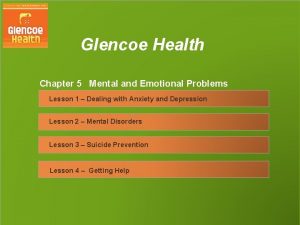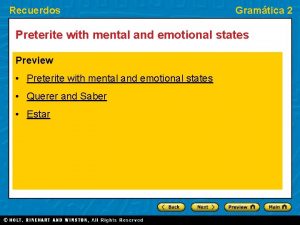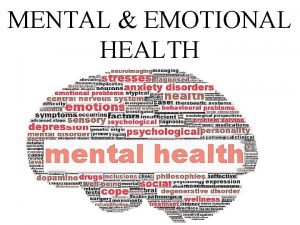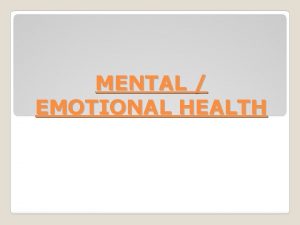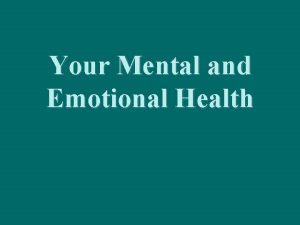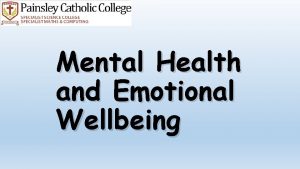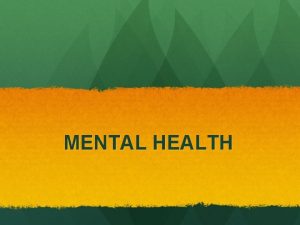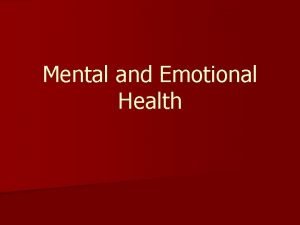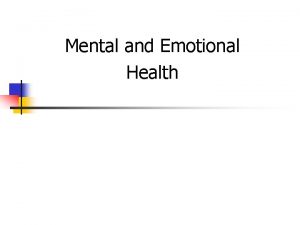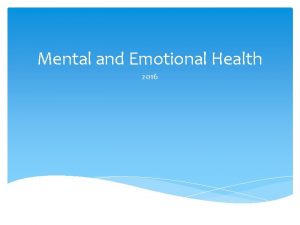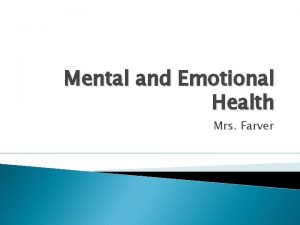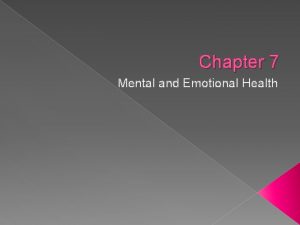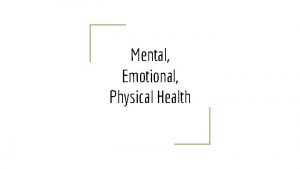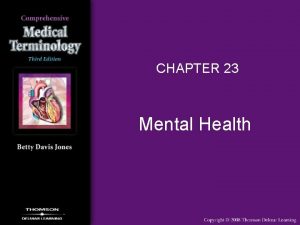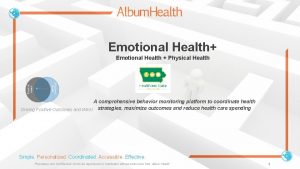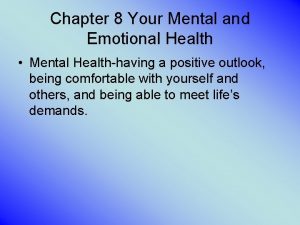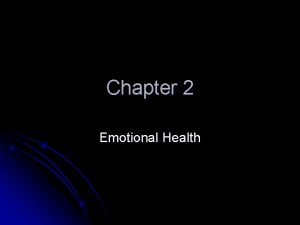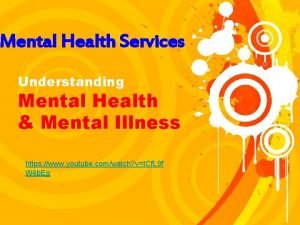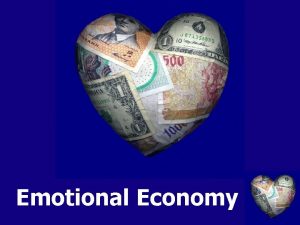Chapter 5 Mental and Emotional Health Day 2



























- Slides: 27

Chapter 5 Mental and Emotional Health Day 2 Lessons 3 & 4

Daily Journal • In your Journal section… Write a few sentences briefly describing a specific time when you felt stress. How did you manage your feelings?

Your Emotions • People can experience and express a wide range of feelings. • All of your life experiences go hand in hand with some kind of feeling or emotion. • Emotions affect all sides of your health triangle.

Defintion • Emotions: Feelings such as love, joy, or fear

Definition • Mood swings: Frequent changes in emotional state

Mood Swings • It is normal to experience many different emotions, sometimes in a short period of time. • Mood swings happen mainly because of physical changes in the body such as change in hormone levels, worries over the future, and concerns over relationships.

Managing Your Emotions • Emotions are not always easy to recognize. • If you can identify your emotions you can think of healthy strategies for dealing with them.

Managing Your Emotions • How you manage your emotions can affect those around you. • It is important to remember that emotions themselves are not positive or negative. It is how you cope with them that matters.

Types of Emotions • Common emotions include happiness, sadness, anger, fear and grief. • You may think of these emotions as “good” or “bad” but they are all normal because everyone experiences them.

Happiness • Happiness makes people feel good. • People often feel happy when their needs are met. • People who are happy tend to smile and have plenty of energy. • They wish to share this emotion with others.

Sadness • You might feel sad when you lose something you care about or when you don’t succeed at an activity you want to do. • Sad feelings don’t usually last very long in people that are emotionally healthy.

Anger • Anger is a natural reaction to feeling threatened. • It can be a warning signal. • Anger can also help release tension. • The key is to let anger pass.

Fear • Fear like anger, can serve to protect us. • Fear can also be unhealthy. • It can make it difficult for you to take an active part in life. • It is important to deal with fear healthfully so that it does not last too long.

Grief • Grief is a normal, healthy reaction to a loss. • You might think is applies only to death, but you can feel grief over other losses, such as the loss of a relationship.

The Five Stages of Grief • Shock • Anger • Bargaining • Sadness • Acceptance s e l d n a h e n o y s r e e g v a E t s e s the y l t n e r e f f di

Managing Your Emotions in a Healthful Way • Managing these emotions in a healthful way is part of good mental and emotional health. • To deal with anger you should take time to cool down and think about what you want to say. • Discuss the situation with someone you trust who is not involved. • Then calmly tell the person how you feel without placing the blame.

Managing Your Emotions in a Healthful Way • To cope with other strong feelings such as sadness or fear, try writing in a journal, listening to music, or engaging in a hobby you enjoy. • Talk to a friend or trusted adult about how you feel. • Physical activity can also help you focus your energy so that you feel more capable of dealing with your feelings.

Managing Stress • http: //www. youtube. com/watch? v=hnp. Qr. Mq Doq. E&safety_mode=true&persist_safety_mo de=1&safe=active

Definition • Stress: The body’s response to real or imagined dangers to other life events.

Stress • Stress is an everyday experience, felt by all people at all ages. • You cannot get rid of all stress completely but you can learn to deal with it effectively • Stress can be positive or negative

Definition • Positive Stress: Stress that can help you reach your goals.

Definition • Distress: Stress that prevents you from doing what you need to do, or stress that causes you discomfort.

Definition • Stressors: Sources of stress. • Can you think of stressors that have caused you to feel stress today?

Definition • Fight-or-flight response: The body’s way of responding to threats.

Definition • Adrenaline: A hormone that increases the level of sugar in the blood, giving your body extra energy. • *Adrenaline also increases your heart rate and blood pressure.

Definition • Fatigue: Tiredness • After a stressful situation you may feel fatigue because your body directed much of its energy into the fightor-flight response.

DIY Time • Using an index card create/draw a stressful situation • In a small group (4 or less people) share your flash cards and come up with suggestions on how to handle each situation (need help? see Mrs. Bauder’s example)
 Chapter 3 achieving mental and emotional health answer key
Chapter 3 achieving mental and emotional health answer key Chapter 3 achieving mental and emotional health
Chapter 3 achieving mental and emotional health Chapter 3 mental and emotional health
Chapter 3 mental and emotional health Chapter 5 lesson 3 health
Chapter 5 lesson 3 health Chapter 3 mental and emotional health answer key
Chapter 3 mental and emotional health answer key Chapter 3 achieving mental and emotional health
Chapter 3 achieving mental and emotional health Emotional health defintion
Emotional health defintion Chapter 15 achieving mental and emotional health
Chapter 15 achieving mental and emotional health Chapter 3 mental and emotional health
Chapter 3 mental and emotional health Chapter 3 achieving mental and emotional health
Chapter 3 achieving mental and emotional health Chapter 3 achieving mental and emotional health
Chapter 3 achieving mental and emotional health Chapter 3 lesson 2 health
Chapter 3 lesson 2 health Chapter 3 achieving mental and emotional health
Chapter 3 achieving mental and emotional health Chapter 15 achieving mental and emotional health
Chapter 15 achieving mental and emotional health Day 1 day 2 day 3 day 4
Day 1 day 2 day 3 day 4 Mental health and mental illness chapter 20
Mental health and mental illness chapter 20 Chapter 5 mental and emotional problems lesson 2 answer key
Chapter 5 mental and emotional problems lesson 2 answer key Wellbeing triangle
Wellbeing triangle Mental emotional health
Mental emotional health Chapter 5 mental and emotional problems lesson 4 answer key
Chapter 5 mental and emotional problems lesson 4 answer key Chapter 5 mental and emotional problems
Chapter 5 mental and emotional problems Glencoe health chapter 5
Glencoe health chapter 5 Chapter 9 mental and emotional problems
Chapter 9 mental and emotional problems Chapter 5 glencoe health answers
Chapter 5 glencoe health answers Mental health jeopardy questions and answers
Mental health jeopardy questions and answers Day 1 day 2 day 817
Day 1 day 2 day 817 Mental health awareness poem
Mental health awareness poem Is mental and emotional states preterite or imperfect
Is mental and emotional states preterite or imperfect
